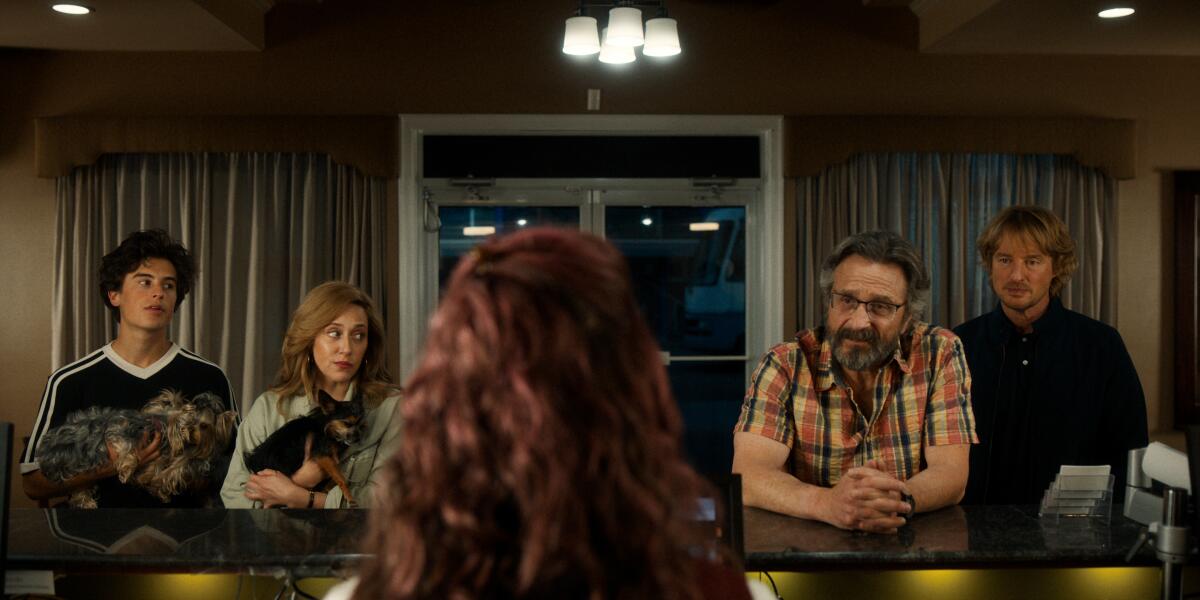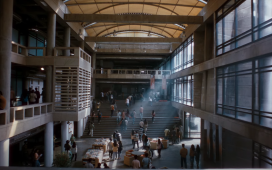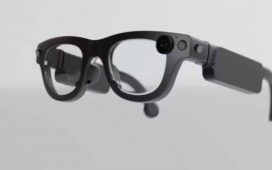“Stick,” premiering Wednesday on Apple TV+, is a sweet, lovely, funny show — a sports story, a road movie, a coming-of-age story and briefly a caper film. Here and there it asks you to credit something a little beyond belief, without insulting the show’s emotional intelligence. Golf is the hook on which the story hangs, but it’s not really about golf, or even winning at it, but about anger and joy, being lost and found, wrecked and repaired, listening and learning, which applies in different degrees to each of the principal characters; everybody hurts.
If your problem with “Ted Lasso,” a series whose name surely came up as “Stick” was making its way to the screen, is that it wasn’t sufficiently realistic or was too sentimental, this show is probably not for you. I don’t have that problem and am very happy here.
Floppy-haired, broken-nosed Owen Wilson plays Pryce Cahill, a former champion golfer — a legend, even — whose life fell apart after a family tragedy and whose career dissolved after an on-course meltdown, televised live. Upselling golf clubs in a pro shop and running bar scams with his grumbling old caddy, Mitts (Marc Maron), he lives among accumulating garbage in the house he shared with his exasperated but caring ex-wife Amber-Linn (Judy Greer) and refuses to vacate, drinking beer, smoking pot and eating Lucky Charms out of the box. (“They’re his favorite,” Mitts will later say, “because he’s a child.”) The dented yellow sports car he drives, a remnant of his former success, is spotted with Bondo. “Stick” is Pryce’’s nickname but “Stuck” would have worked for a title as well.
One day, while giving a lesson on a local course, he hears a sound that makes him turn, and discovers 17-year-old Santi Wheeler (Peter Dager), driving balls with great power and accuracy, and starts asking questions. Santi takes him for a kook — “Aren’t younger people supposed to annoy older people, not the other way around?” — especially when Pryce, who sees “the chance to leave something behind other than a YouTube clip of the worst day of my life,” turns up at the grocery where he works, offering to help him become great. (He is already almost supernaturally phenomenal, but raw.)
Though Santi likes to hit, perhaps just to blow off steam, he has become alienated from the game and resistant to advice — for reasons we will learn, besides the usual teenage anomie. But encouraged by his mother, Elena (Mariana Treviño, wonderful), he begins to warm to the idea, and so the stage is set for a journey that will take them through a series of tournaments on the way to the big U.S. Amateur match and Pryce’s much foreshadowed reunion with his old nemesis Clark Ross (Timothy Olyphant, handsome and slick), as close as the series’ comes to a villain, but, in the genial spirit of the show, not really very villainous at all.

Along for the ride with Santi (Peter Dager), left, are his mother Elena (Mariana Treviño) and Mitts (Marc Maron), Pryce’s friend and former caddy.
(Apple)
After a sequence of hurdles, deals and pleas that occupy the first two of 10 episodes, Pryce, Santi, Elena (and her three small dogs) and Mitts, hit the road in Mitts’ Winnebago, in which he had planned to visit all the national parks with his late wife, and about which he is emotionally particular. Soon they’ll pick up a fifth companion, Zero (Lilli Kay), a young person of no fixed address or gender, whom Santi, angry with Pryce, encounters at a ripe moment, just after Zero, who styles her pronouns “she/they,” has quit her job as a clubhouse bartender. “Sounds like he’s exploiting you,” Zero says, “making you jump through his hoops for his own ego and personal gain … It’s what these capitalists do.” But though she/they begins as a caricature of knee-jerk youthful overreaction and general mistrust of the olds, Zero will join the team.
It is something of a generation gap comedy. (The creator, Jason Keller, who wrote “Ford v. Ferrari,” is 56, for what that’s worth.) Young viewers, assuming they come, may find themselves poorly represented; older ones might find it speaks to their own thoughts about kids these days. But the gaps are there to be bridged, just as the walls are made to come down. There is perhaps a bit too much storming off, which I put down in part to the length of the series and the need to create and resolve crises and make feelings felt. On the other hand, “Stick” stays more than usually focused — there are no subplots — which gives the dialogue room to breathe; we learn things incidentally rather than by having them presented as bullet points.
As in all good sports stories — all good stories, perhaps — the heroes are underdogs; winners only being really interesting if they were losers first, and there are elements in “Stick” of perhaps the two greatest narrative templates of the 20th century — the most used, anyway — “The Wizard of Oz” and “The Bad News Bears.” (The first two episodes are directed by Valerie Faris and Jonathan Dayton, whose “Little Miss Sunshine” is another tale of underdogs on the road.) Because of the sort of show this is, there are a few things that are obviously going to happen — that you want to happen — although the series will keep you unsure on the way to their happening. But unpredictability is not the point. What matters is that the characters are more individuals than types, that they remain consistent, and that their reactions and interactions are, one might say, chemically valid. And “Stick” works beautifully in that regard.
The series rides on a host of wonderful performances. Wilson, whom the role fits so well he might have been measured for it, has a gift for playing eccentric regular guys and adolescent adults, and mixing, almost superimposing, sadness and happiness. (“I look in the mirror, I would not bet on that guy,” he says, but he’s an optimist despite it all.) Maron, the William Demarest of the piece (Preston Sturges fans), gets a lot of subtlety into his grumblings; as the most open of the characters, Treviño does great expressive things with her hands and eyes. Dager and Kay smoothly navigate the ups and downs and sharp turns of their characters.
There are enough loose threads to suggest a second season was on Keller’s mind from the beginning — well, that’s TV, isn’t it? — but should that not come to pass, the arc this season completes is perfectly satisfying; not every open question needs to be answered, and my affection for the characters is such that I fear the troubles a second season will necessarily cook up for them. I’ll watch it, though!









